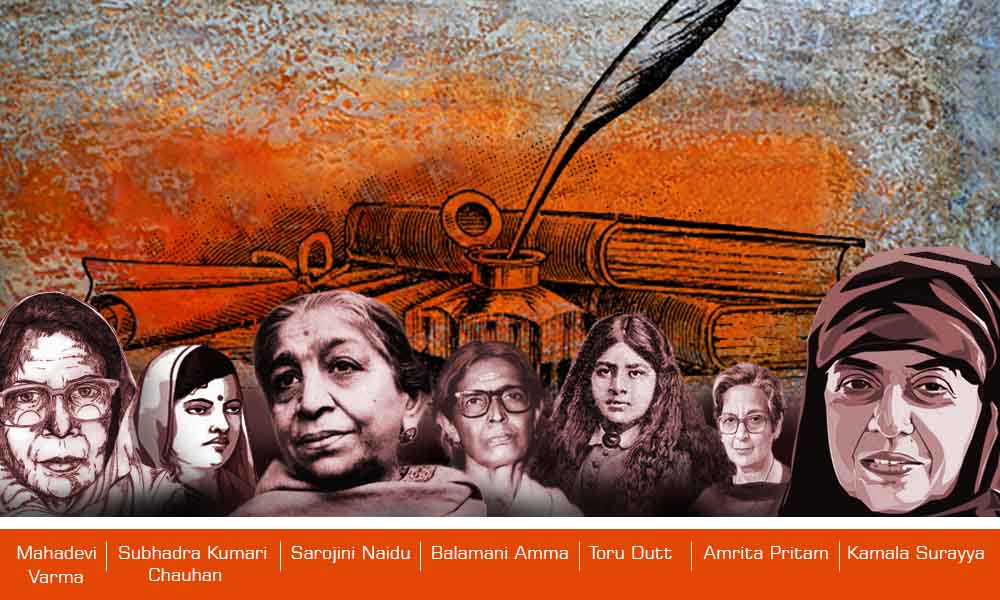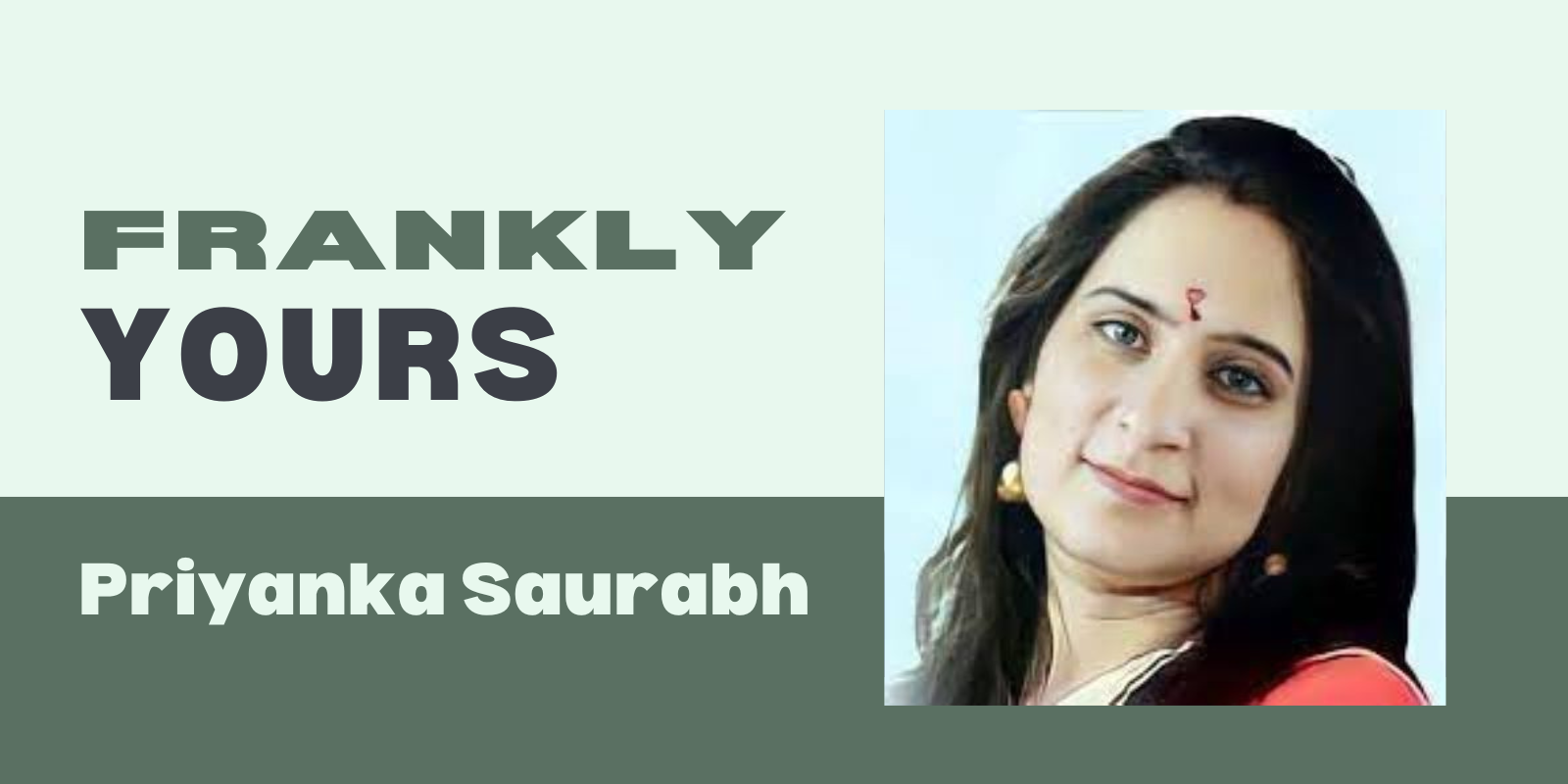“A thorn in the eye of Hindi literature: Independent women”
The Hindi literature world still cannot digest the real independent and enlightened women. They want a female writer of the kind they want. She should write on soft issues, family, society, some psychology, and man-woman relationships. For them, the synonym of modernity or a modern woman is that she can write boldly. In the name of bold writing, this society praises vulgarity in female writers and bestows them with big words. They do all this in the name of women’s freedom.
Those confused women also consider opposing family, opposing culture, and supporting perverted sexuality as bold and modern, and keep strutting like puppets in their hands. It is a pity that they do not know that they are puppets; they are made to write whatever they want, and that too by coating them in the syrup of modern, courageous, bold, independent, enlightened words. Writing of slimy literature, destruction, and negativity is what makes them bold and enlightened.
The Hindi literature world still cannot digest the real independent and enlightened women. They want a female writer of the kind they want. She should write on soft issues, family, society, some psychology, and man-woman relationships. For them, the synonym of modernity or a modern woman is that she can write boldly. In the name of bold writing, this society praises vulgarity in female writers and bestows them with big words. They do all this in the name of women’s freedom.
Those confused women also consider opposing family, opposing culture, and supporting perverted sexuality as bold and modern, and keep strutting like puppets in their hands. It is a pity that they do not know that they are puppets; they are made to write whatever they want, and that too by coating them in the syrup of modern, courageous, bold, independent, enlightened words. Writing of slimy literature, destruction, and negativity is what makes them bold and enlightened.
Even today, enlightened women with independent consciousness are an uncomfortable truth for the Hindi literary world. Women who are masters of their independent intellect, who think, raise questions, and do not fit into the old mold of submissive female writers—they are still not acceptable to the literary community. Even today, they want such female writers who fit into their prescribed mold: those who write on ‘soft’ issues—family, society, a little psychology, and some light-hearted male-female relationships.
When ‘modernity’ is mentioned on the platforms of Hindi literature, it too has a set framework. For them, a “modern” female writer means one who is” “bold”—that is, one who serves obscenity in the name of ‘bold writing. One who is incited in the name of ‘sexual freedom’—opposition to the family, mockery of culture, and distortion of relationships—is said to be synonymous with modernity. And this entire trickery is wrapped up with such sweetness that the confused female writers themselves believe this lie to be true. They are filled with pride about how ‘bold,’ ‘independent,’ and ‘modern’ they have become, while they have become mere puppets in the hands of those literary contractors who make them dance according to their convenience. Sadly, they never have the time to raise this question: whether the lesson of freedom that they are being taught, have those male writers taught the same lesson to the women of their homes as well?

The mindset of the literary society is that women’s writing should be limited to a hidden realm of tender emotions, beauty, love, separation, or soft porn. If a woman dares to write seriously on geopolitics, religion, philosophy, spirituality, international relations, sociology, politics, education, economics, or policies, she makes them uncomfortable. This unbearable thought gets embedded in their minds: “These are the fields of men.” Women should only embellish words—they should not raise deep questions. Depth of thoughts, sharpness of analysis, and intellectual boldness—all these are still considered ‘male bastions’ in the Hindi literary scene.
A woman who neither bows down to the desire of any award nor compromises her ideas in the greed of any platform nor is hungry for the favor of any famous critic, a woman who is alert and firm about her thoughts, values, and character—she is still a dangerous presence for the Hindi literary world. Such a woman being the owner of her own conscience and her independence scares them, irritates them, and makes them uncomfortable. They start awarding her with titles like ‘arrogant,’ ‘insensitive,’ ‘fanatic,’ and ‘over-intellectual’ so that she can be pushed to the margins. But all their ridicule, all their criticism, is just a trivial noise for that woman, who knows that her war is not against the darkness outside but against the darkness within.
Look at this paradox: those who taught women the lesson of ‘modernity’ in the name of sexuality still apply the same criteria of ‘purity,’ ‘decency,’ and ‘tradition’ to the women of their own homes. For them, ‘boldness’ is only for the women of the outside world. The women of the house should still remain veiled, should remain silent, and should remain modest.
Women who sell their freedom for obscenity, their modernity for self-deception, and their courage for the pseudo-support of patriarchy—they do not actually become a part of any revolution but rather become the new cherries of that patriarchal literary system.
The harsh truth is that “Women’s Liberation” has also become a brand today. It is traded, displayed on stage, and distributed as awards.
The rebellion of a woman with an independent consciousness is very subtle and invisible. It is not expressed in vulgar language, not in negativity, not in outrageous boldness—but in the depth of thought, in the accurate analysis of issues, and in the honesty of her writing.
When she writes about love, she explains the complexity of compassion. When she writes about politics, she draws a picture of the suffering of the people in the churning of power. When she writes on religion, she breaks the web of superstition and intolerance.
She knows that the true purpose of literature is to reveal the truth, not to become a pawn to power, greed, and the sexual market.
Hindi literature will now have to accept that women are not just symbols of “decoration” or “sensitivity.” They now ask questions, analyze, break, and create. And most importantly, they no longer want to become pawns of anyone’s agenda.
They have become the creators of their own thoughts, their own pens, and their own future. The sooner the literary society understands this change, the better it will be; otherwise, only puppets will keep dancing in their world, and women with independent consciousness will keep making new paths for themselves in history.
“When a woman raises her voice, she does not just speak for herself; she challenges the silence of the entire society.”





